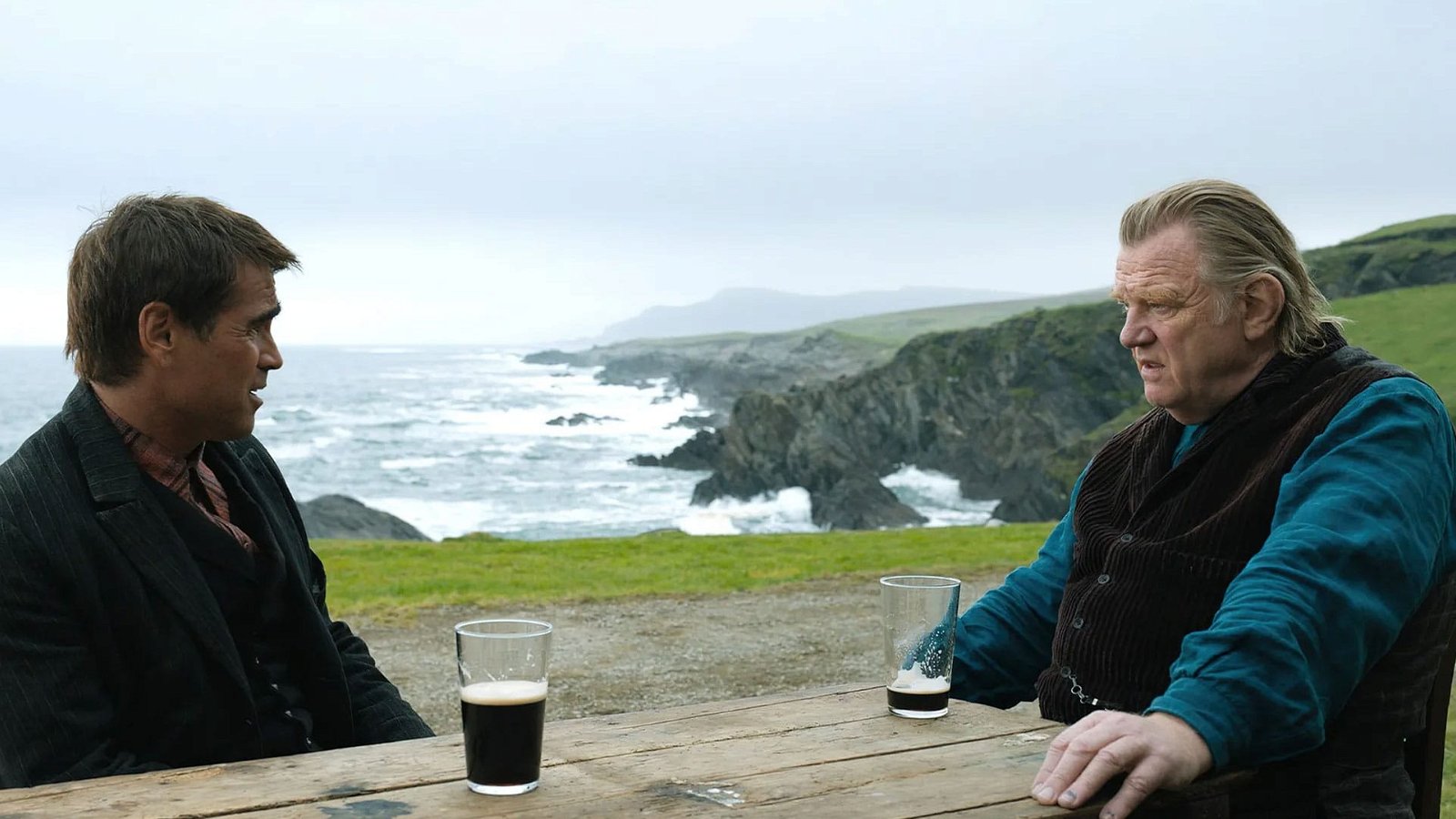I have a few filmmakers who always find my funny bone. There’s obvious ones, like Judd Apatow, or Adam McKay, who’ve made some of the funniest movies of all time like Anchorman or the 40 Year Old Virgin. But especially as I get older, I’ve grown fonder of wickedly funny filmmakers like Martin McDonagh. I mean, who comes up with racist little people, humorous haunting policemen, and characters so insane that Christopher Walken’s is only the 4th craziest, right behind a menacing man with a rabbit? For The Banshees of Inisherin, McDonagh goes back to his Irish roots applying his strange sense of humor to his ancestors before him.
McDonagh takes us back only a couple generations: to 1920s Inisherin (Inishmore and Achill Island in reality, for people who WILL want to travel here). The bombs from the Irish Civil War can be seen from the island as Padraic (Colin Farrell) goes on what is clearly his daily routine, of grabbing his best pal Colm (Brendan Gleeson) and going to the local pub for a beer. On this day, however, Colm decides to make a lifestyle change, and decides he wants Padraic out of his life forever. Confused, Padraic seeks solace from his sister Siobahn (Kerry Condon) and the “village idiot” Dominic (Barry Keoghan) while he tries to patch things up with Colm.
Translating McDonagh’s modern shock and awe sensibilities to 1920’s Ireland isn’t as hard of a task as I thought it would be. F*cks are now “fecks”, like “Me feckin brother” for example. I can personally attest to this, being of Irish decent: old Irish folk guard their personal feelings as much as humanly possible, and try as hard as they can to present a “nice” image. So when one of them isn’t being nice, it confuses the hell out of everyone else, who need an explanation for why the not nice person is doing what they are doing. Those hilariously awkward conversations bring little resentments between everyone to the fore, which erupt in some of the funniest, darkest name calling and confused looks. Watching a priest’s innocuous confession question to a parishioner result in an expletive laden shouting match inside the booth is never not funny. Small town gossip is apparently the same everywhere and every time, as there’s always people in each other’s business, like the town trading post owner whose mail deliveries always slip open. Plus, 1920’s Ireland’s violent punchlines hit just as hard as they do today: maybe harder when you see the victims. McDonagh’s Irish roots come right to the fore in Banshees as his culturally specific wicked sense of humor pops as hard, maybe harder than his previous films.
And like his other films, those jokes come out to reveal something sad and foreboding underneath. As people get older, life goes one of two ways. The older person is comforted by their routines, or the older person desires to break from them. This is the underlying fragility of Padraic and Colm’s relationship. The two don’t understand one another inevitably: the harder Colm tries to pull away, the harder Padraic is going to try to keep talking to him, until one of them ends up dead. Fear is the cause for both lifestyle choices, and that fear is usually too hard to overcome for most people. McDonagh also touches on themes of repressed feelings, unfailing stubbornness, being remembered vs. being loved, and what happens when dreams die. Humor is usually a wonderful defense mechanism against these very scary thoughts and feelings, and you can see all of these people on this lonely static island coping with the fear in their own ways. Some will find ways to cope in a positive way (being more creative), and some can’t, leaving them only dark options. McDonagh, and his two muses Colin Farrell and Brendan Gleeson (with a side dose of unhinged Irish Barry Keoghan and wonderful Kelly Condon), capture this depth of feeling magnificently, riveting the screen as only great actors with great scripts can do.
One of my Irish grandfathers was probably the Brendan Gleeson type. Stubborn in what he wanted to do, he came to the US and found a wife and a home, making the change in his life he desired. Conversely, I have other Irish relatives who are totally content in their day to day existence, happy in the routine of taking care of their kids, working out, listening to music, and maybe a weekend glass of wine or two. The Banshees of Inisherin takes Irish history and translates it through that wonderful addage, that life is a simultaneous mixture of comedy and tragedy, never forget it.

